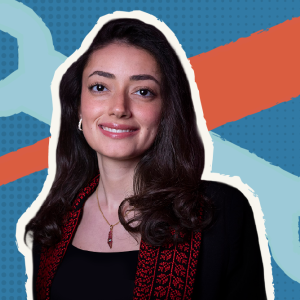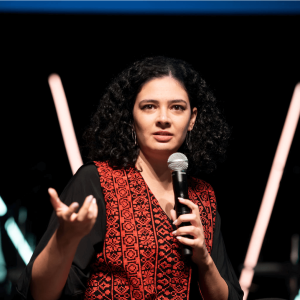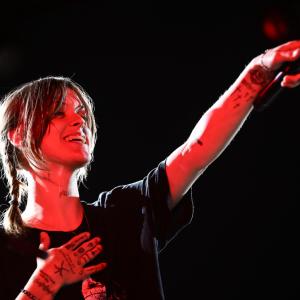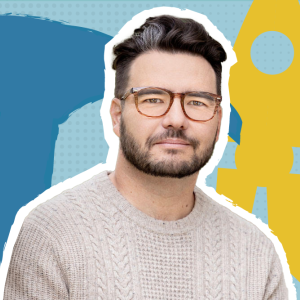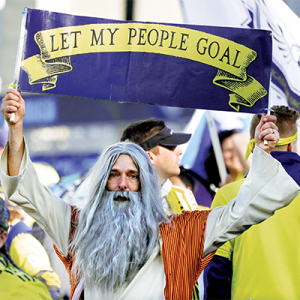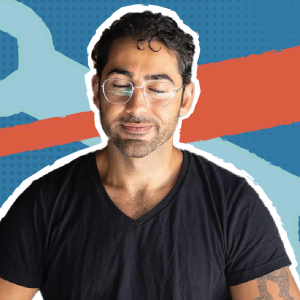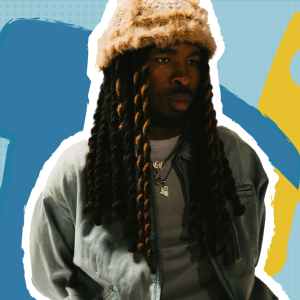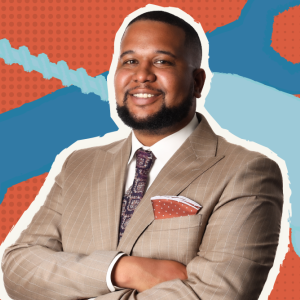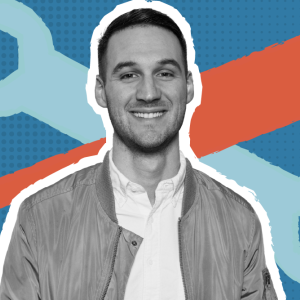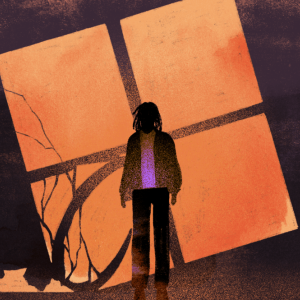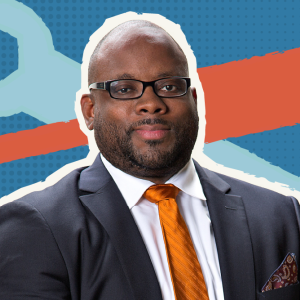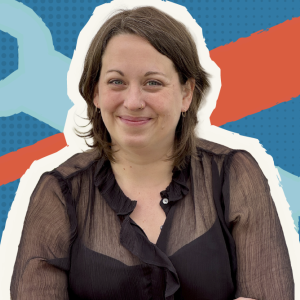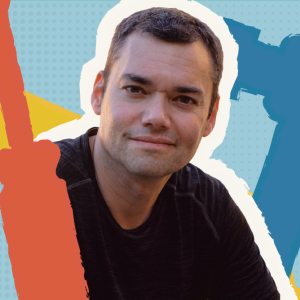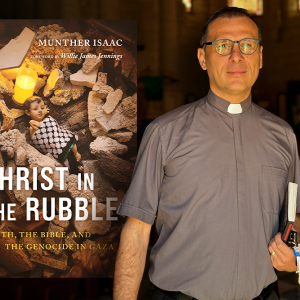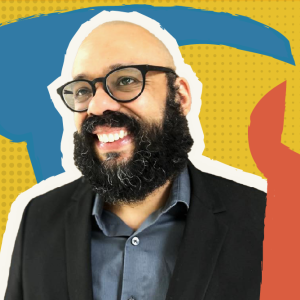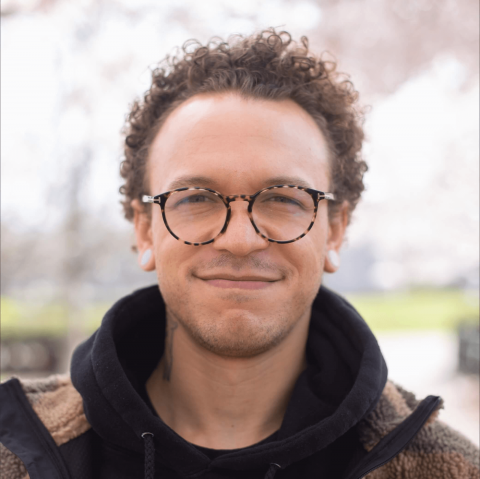
Josiah R. Daniels (he/him) joined Sojourners in 2021 and is the senior associate opinion editor at sojo.net. He is a native of the southwest suburbs of Chicago, but currently resides in the Pacific Northwest with his family. He is a graduate of Cornerstone University in Grand Rapids, Mich.
Josiah loves being a journalist because he believes everything must be questioned and investigated. In all his coverage, he prioritizes fairness, accuracy, and journalistic integrity. Along with following Sojourners’ editorial policies and procedures, he also follows the Society of Professional Journalists’ code of ethics.
Josiah is the co-founder of The Reconstruct interview series, which focuses on interviewing people who have faith in a new future and are working toward repairing the present. He also co-leads The Sojourners Journalism Cohort.
His coverage areas are primarily identity, religion, politics, and class. He has written book and movie reviews and reported on a church that became an impromptu shelter for hundreds of refugees seeking asylum in the United States. In 2023, NPR’s Weekend Edition interviewed him about a piece he wrote criticizing an ad campaign for spending millions of dollars to rebrand Jesus via TV spots. He is especially interested in the genre of narrative journalism.
When not working, he is begrudgingly watching a Chicago Bulls game, playing basketball, or listening to John Coltrane’s A Love Supreme. He does not have or use social media.
Posts By This Author
‘America First’ Resurrects the Logic of Crusades in Venezuela

During his life, Otto Maduro, the late Venezuelan sociologist and liberation theologian, lamented how the majority of Latin Americans were being treated to “fatten the bank accounts” of a small minority. This deeply troubled Maduro. As he wrote in his 1982 Religion and Social Conflicts, “I cannot submissively cross my arms in the face of certain allegedly ‘Christian’ attitudes and traditions that appear to me to be an antievangelical instrumentalization of the church in the service of social injustice.”
Taylor Cassidy Shows the Fun Side of Black History
This interview is part of The Reconstruct, a weekly newsletter from Sojourners. In a world where so much needs to change, Mitchell Atencio and Josiah R. Daniels interview people who have faith in a new future and are working toward repair. Subscribe here.
I’m not on TikTok, so I’d never heard of 22-year-old content creator, Taylor Cassidy. Cassidy rose to prominence after she started creating engaging and easily digestible videos about Black history. During my interview with Cassidy, she told me her goal is to make sure her audience feels uplifted and excited about learning.
Looking at Life Through the Eyes of Gaza
The Committee to Protect Journalists has estimated that since Israel’s war with Gaza began in October 2023, Israel has killed 235 journalists and imprisoned another 86. According to CPJ, this has been the deadliest period for journalists since they first began collecting data in 1992.
Palestinian Christians Have a Warning for the American Church
Last weekend, I visited my home state of Illinois to attend the Church at the Crossroads conference, which was held at Parkview Community Church in Glen Ellyn. Conference organizers estimated that 580 attended in person and 300 more joined virtually. The conference was convened to encourage American evangelicals to listen to Palestinian Christians and to confront and correct those who use scripture to “justify war, occupation, or silence” in the face of the escalating violence in Israel and Palestine.
Practically speaking, though, what was the point of this shindig?
The Doubt and Faith of a Journalist, Parent, and ‘Full-Time Arab American’
Aymann Ismail has a variety of identities that keep him busy. When I asked him to tell me about himself, he replied, “I’m a journalist, a parent, and a full-time Arab American.” He is also the author of the new memoir, Becoming Baba: Fatherhood, Faith, and Finding Meaning in America.
One of the things I appreciate most about Ismail, who is Muslim, is the way he subtly incorporates reflections on his faith into his writing. In Becoming Baba, Ismail relates how he sat down to read the Quran, only to vehemently disagree with what he read. This led him to explore his doubts and questions, which Becoming Baba explores in an engaging and refreshing way.
Ethel Cain Is Freeing Me From the Trauma of James Dobson
Hearing about the news of James Dobson’s death reminded me of a conversation I recently had with my sister while we were making our way to an Ethel Cain concert.
We were conversing as we hurried to the car, excited to profess our love to Willoughby Tucker, and I told my sister she was the only reason I knew about Ethel Cain—whose real name is Hayden Anhedönia. We then indulged in some cynical jokes about the “woke” impulse to cancel Anhedönia because of old social media posts, which she has since apologized for and described as “deeply shameful and embarrassing.”
The Israeli Human Rights Group Urging the World to Confront Genocide
As an editor and journalist, it’s my job to have words for the news of the day. But now and then, the news of the day has a way of robbing me of all my words. This is especially the case when the news of the day revolves around an injustice that is actively harming our world and humanity. What truly leaves me wordless is when we, as people, know that something catastrophic is happening, but we seek to minimize or ignore it. How do I change that? Is there a perfect combination of words and data to prevent that?
A specific example is Israel’s ongoing genocide in Gaza. I’m not sure what else has to be said at this point to help people realize that a genocide is happening right before our very eyes, and it is likely to expand beyond Gaza into the occupied territory of the West Bank. One of Israel’s leading human rights organizations—B’Tselem—is desperately trying to raise the alarm about this very fact.
Brad Onishi’s Answer To Fighting Extremism Isn’t What You Want To Hear
Brad Onishi is the co-host of a podcast titled Straight White American Jesus. With co-host Daniel Miller, Onishi examines and deconstructs evangelical politics, theology, and culture. Onishi, who has a doctorate in religious studies, told me that when they began the podcast in 2018, he wasn’t sure if anyone would listen. But now, almost 900 episodes later, they’ve “commented on every angle and every aspect of Christian nationalism, the Trump presidencies, the Biden presidency, and everything in between: from gender to race, sexuality, church politics, and so on.”
How a CCM Guitarist Became a Soccer Team’s Unofficial Ambassador
Biblical Moses sought to prevent revelry; Soccer Moses lives to promote it.
PICTURE THIS: A man they call Soccer Moses is descending a set of stadium stairs, parting not the Red Sea but a crowd of Nashville soccer junkies. As he reaches the bottom of the stairs, he puts on a Gibson guitar and performs a celebratory riff, which is a tradition for the Nashville Soccer Club, a Major League Soccer team. As Soccer Moses shreds his guitar, fans surround him and wave signs, scarves, and a Pride flag. One of the many differences between the biblical Moses and Soccer Moses is evident in this scene. Biblical Moses sought to prevent revelry (Exodus 32:18-19); Soccer Moses lives to promote it.
Soccer Moses is the unofficial team mascot for Nashville SC. Why, if Nashville SC is not connected to religion in any way, has a zealous fan taken it upon himself to dress up like Moses and become the team’s unofficial ambassador? Well, to understand that you first need to know the identity of the man donning the wig, fake beard, and flowing garments.
Meet the Palestinian Student Who Just Beat the Trump Administration
Most would agree with the Nigerian-British singer-songwriter Sade that we don’t need any more war, but we are in desperate need of just a little peace. So, what do we do when it becomes clear that the people advocating for that peace are being thrown in prison or portrayed as “terrorists” who are interfering with the “peace process” in the Middle East due to their advocacy for Palestinian human rights?
Mohsen Mahdawi, who is a legal permanent resident in the U.S., was detained by Immigration and Customs Enforcement agents on April 14 as he exited his citizenship interview at a U.S. Citizenship and Immigration Services office in Vermont. President Donald Trump’s administration accused Mahdawi of potentially undermining the peace process in the Middle East. But despite this accusation, the government has not charged Mahdawi with a crime. Mahdawi was released from detention on April 30 after U.S. District Judge Geoffrey Crawford granted him bail, commenting that Mahdawi had “made substantial claims that his detention was in retaliation for his protected speech.”
The Christian Rapper Who Thinks You’re Loving the Wrong Neighbor
I’ve interviewed celebrities and entertainers before, and my main complaint is always this: They tend to dodge tough topics, which then results in pretty dull conversations.
So when I got on the phone with Christian hip-hop artist Dylan Phillips, whose stage name is nobigdyl., I thought getting him to say anything interesting would be about as hard as fishing for catfish.
But I didn't have to fish long before I realized that nobigdyl. was more than willing to tackle difficult subjects.
Does Protesting Work?
Some of the discourse surrounding the LA protests reminds me of similar things I heard back in 2014, too. On the one hand, you have centrists and liberal pundits who are lecturing protesters about needing to remain nonviolent — which is quite easy to suggest from a work-from-home station largely insulated from the raids that working class Angelinos are enduring. On the other hand, there are the cynics — a group that, despite my best efforts, I sometimes find myself identifying with — and they are asking if protesting makes any difference at all
Why Do So Many Christians Fall For Conspiracy Theories?
In NPR’s Alternate Realities, Zack Mack, who is a podcast producer and storyteller, hosts a three-part series about his father falling down the conspiracy rabbit hole and the effect it has on his family. After challenging his dad about his conspiratorial thinking, his father responded by suggesting they make a bet: He would make 10 predictions that he believed would come to pass before the end of 2024, and for each one he got right, Mack would pay him $1,000. For each one he got incorrect, he would pay his son $1,000. Mack’s dad, who is a Christian, was certain that his predictions were ironclad.
How Authoritarian Politics Took Over My Christian College
Since graduating, I’ve largely tried to ignore all things related to Cornerstone. Whenever I would hear news about the school — whether it involved limiting intellectual freedom, disassembling the humanities department, or dismissing employees deemed to be insufficiently conservative or supportive of the president — it only served to confirm my ignorance-is-bliss approach. For a long time, whenever I was confronted with the fact that Cornerstone had only become more restrictive since I graduated, what came to mind was the first half of a quote from the writer James Baldwin: “Not everything that is faced can be changed …”
What We Are Getting Wrong About Christian Nationalism
Christian nationalist ideology expanding to nonwhite and non-Christian populations is a particular area of interest for Eric L. McDaniel, who is a professor in the department of government at the University of Texas at Austin. In The Everyday Crusade: Christian Nationalism in American Politics, McDaniel and his co-authors, Irfan Nooruddin and Allyson F. Shortle, explore how religious nationalist ideology is gaining influence with the American public.
Slouching Towards the Truth
Alissa Wilkinson, a movie critic at The New York Times and a Didion expert, is especially interested in how Hollywood continues to use such cliches when telling stories. Her newest book, We Tell Ourselves Stories: Joan Didion in the American Dream Machine, is an exploration of Didion’s writing in connection to the movie business and how her observations about Hollywood can help us interpret the current political landscape
Jesus Was a Terrorist
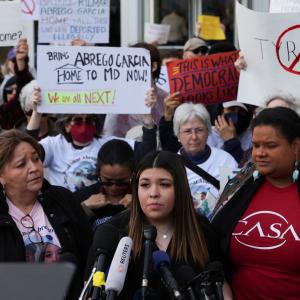
Jennifer Vasquez Sura, wife of Kilmar Abrego Garcia, speaks during a press conference on the day of a hearing in the case related to Kilmar Abrego Garcia, the Salvadoran man who was deported without due process by the U.S. President Donald Trump administration to a prison in El Salvador, outside U.S. District Court in Greenbelt, Maryland, U.S., April 15, 2025. REUTERS/Leah Millis TPX IMAGES OF THE DAY
At some point this Easter Weekend, Christians will be reflecting on the final words that Jesus spoke from the cross, sometimes referred to as the seven last words of Jesus.
When I was younger, I was convinced that System of a Down’s “Chop Suey!” was a Christian song because lead vocalist and lyricist Serj Tankian incorporated Jesus’ final declarations into the song. But dissimilar to the order that Christians have typically arranged Jesus’ final words, the song first quotes the cry of reunion and then climaxes with the cry of dereliction.
Considering that the Roman Empire believed Jesus was a terrorist and crucified him as one, emphasizing the cry of dereliction seems apt.
Has Zionism Become an Idol?
Peter Beinart, author of Being Jewish After the Destruction of Gaza, rejects the idea that the liberation of Palestine is an antimsemitic project. In fact, he argues that Zionism has become an idol for some Jewish leaders, and advocating for Palestinian people
If God Can Roll Away Stones, Why Are Palestinians Still Trapped Under the Rubble?
In ‘Christ in the Rubble,’ Palestinian pastor Rev. Munther Isaac surveys the devastation of his homeland and finds God in the most unexpected places.
Is ‘Wokeness’ Worth Saving?
The term “woke” has become something of an anathema in recent years. Those on the Right use “woke” to disparage anything they think of as social justice or political correctness. Those on the Left initially deployed the term to describe a person who was socially conscious, but after it became apparent that banks and corporations were adopting “woke” coded language, and that the semantics of “wokeism” were more performative than substantive, “woke” fell out of vogue.

